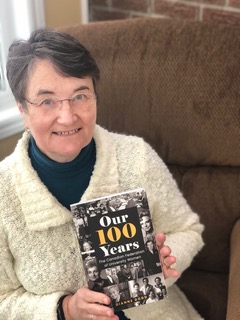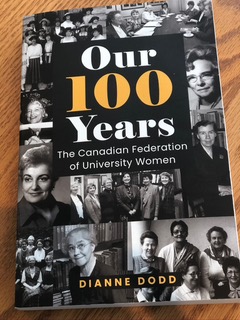This centennial history, sponsored by CFUW and the Feminist History Society, details more than one hundred years of an important First Wave Feminist movement organization, and takes the reader through the Second Wave and up to the present day. When I began writing in 2017, I was still working three days a week at Parks Canada, writing plaque texts and research reports for their commemorative program. One of those reports led to CFUW being designated an event of national historic significance, marked with a bronze plaque at the steps of the Fort Garry Hotel in Winnipeg, where their founding meeting was held. After my retirement, I devoted full time to the book, delving into the organization’s well-kept records, journals and newsletters, many at Library and Archives Canada.
When I began my research, I already knew a little about CFUW but, writing the book taught me so much more. For example, while I knew that CFUW sponsored scholarships, I had no idea just how far their commitment to women’s education extended. Indeed, the organization was founded on the principle that educated women should have work appropriate to their educational level, whether in the community, university, schools, or other workplaces. The inspiration for the founding of local women’s university clubs, several of which came together to launch a national federation in 1919, were educational pioneers who led the campaign to gain access to previously all-male university campuses. After the federation established a post graduate scholarship with an emphasis on research, it continued to keep track of their scholarship winners. Proud of their achievements, the new federation preserved rich biographical details on the lives and careers of these amazing, talented and persistent women. Their stories are fascinating! But, when many of them encountered discrimination in finding academic jobs, the federation stepped up efforts to help them attain positions suited to their qualifications. Among the local clubs who made up the federation, local scholarships were also established to help female university students, and club members supported them to gain full acceptance on campus – they even succeeded in getting a few women appointed to university governing councils.
Over time, the federation built an increasingly sophisticated advocacy machinery to establish policy, influence lawmakers and work within the larger women’s movement. CFUW also fostered many strong leaders. For example, Margaret McWilliams, the federation’s first president, wrote an important post Second World War report for the federal government. Although historian Gail Cuthbert Brandt has noted it was shelved and forgotten at the political level, at the community level, CFUW clubs studied the report and used it to generate lively discussions and activism relating to women in the workforce, home and community. CFUW worked with other women’s organizations to push for the formation of a women’s bureau in the federal Department of Labour, which was created in 1954, with one of its members, Marion Royce as its first Director. The Royal Commission on the Status of Women in 1967 is closely associated with Laura Sabia, the CFUW president who pushed for its formation. It, in turn, laid out a blueprint for the Second Wave of feminist activism in Canada in the 1970s and beyond. Surprisingly, however, CFUW did not submit a brief to the Royal Commission on the Status of Women, although a dozen or so clubs did. That is truly amazing, as CFUW submitted briefs to most royal commissions on topics of interest to them. I will leave you to read the book to find out why this interesting anomaly occurred but suffice it to say that CFUW’s diverse goals were not always in harmony.
There is so much more. Local clubs and the national federation did much community work in the arts, social services and many other areas, while offering its members friendship and the chance to continue learning after they completed their formal studies. As a member of the International Federation of University Women (IFUW) which, during the Second World War, showed great courage and commitment by helping women escape from Nazi-controlled countries, helped them to resettle and re-establish their careers.
Writing Our 100 Years has allowed me to follow my passion of making women proud of, and aware of, their history. Give it a read. Richly illustrated, and selling for only $24.95, the book is published by Second Story Press in spring 2019.
https://secondstorypress.ca/adult/our100years,
Dianne Dodd



Recent Comments